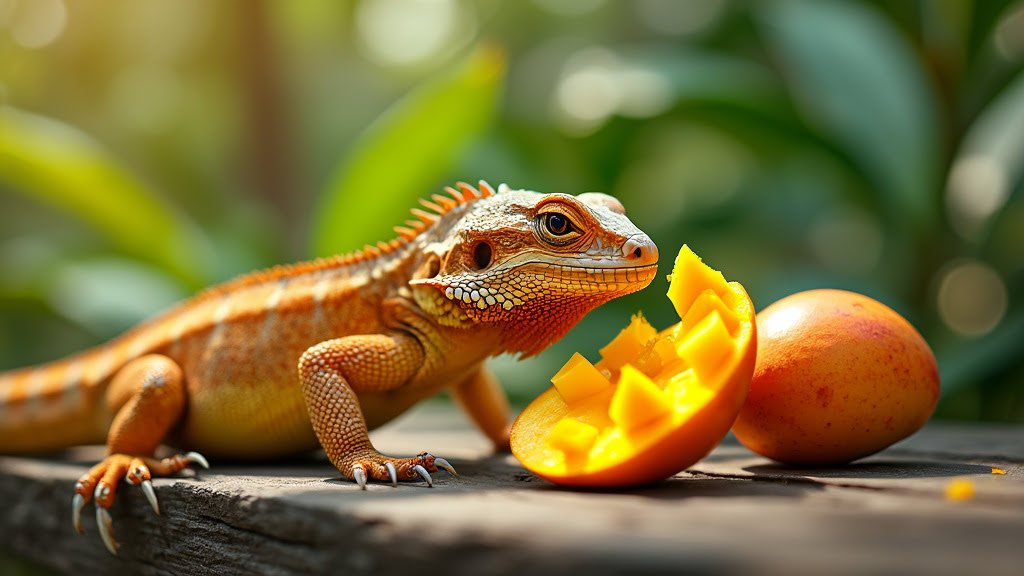Picture a sunny afternoon with a vibrant, juicy mango in your hand. Now imagine sharing this tropical treat with your scaly friend – your delightful bearded dragon. Mangoes are sweet and enticing, but as a caring owner, you might wonder if they are a safe and beneficial addition to your bearded dragon’s diet.
As a proud parent of several bearded dragons, I’ve spent countless hours researching and experimenting with their diet to ensure they are happy and healthy. Join me as we peel back the layers of this juicy question: Can bearded dragons eat mango?
Understanding the Basic Diet of Bearded Dragons
Typical Diet Composition
Bearded dragons are omnivores, which means their diet is quite diverse. Their staple foods generally include:
- Insects: Crickets, mealworms, and dubia roaches.
- Greens: Collard greens, mustard greens, and dandelion leaves.
- Vegetables: Squash, bell peppers, and carrots.
Fruits should be used sparingly as an occasional treat. They are the cherry on top (quite literally) but not the main course.
Nutritional Needs
Maintaining the proper calcium to phosphorus ratio is crucial for bearded dragons to prevent metabolic bone disease. Their bodies thrive on a diet rich in essential vitamins and minerals such as Vitamin D3, which helps them metabolise calcium for strong bones and overall health.
The Profile of Mango
Nutritional Breakdown
Mangoes are not just delicious; they are packed with various nutrients that can potentially benefit your bearded dragon. Here’s a quick rundown:
- Vitamins: Mangoes are rich in vitamins A, C, E, and K.
- Minerals: They provide potassium and magnesium, which are essential for muscle health.
- Sugar Content: Mangoes do have a high sugar content, which means they should be given in moderation.
Educational Tidbit
Mangoes are tropical fruits that grow on large trees and are mainly cultivated in warmer climates. Known for their vibrant orange flesh and sweet flavour, they are enjoyed around the globe. But can our bearded dragons share in this fruity delight?
Health Benefits of Mango for Bearded Dragons
Vitamin A & C
Vitamin A is known for enhancing skin and immune health. It helps keep your bearded dragon’s skin smooth and can boost their immune system. Vitamin C, on the other hand, aids in tissue repair and boosts the immune system as well.
Personally, I’ve noticed that when my bearded dragons get an occasional bite of mango, their overall wellbeing seems enhanced. They are more vibrant and energetic, which is always a joy to see!
Hydration
Mangoes have a high water content, making them a fantastic treat to keep your bearded dragons hydrated, especially during warm weather. Think of it as their little piece of the tropics on a hot day.
Potential Risks of Feeding Mango
High Sugar Content
Mangoes are undeniably sweet, but with sweetness comes high sugar content:
- Obesity and Diabetes: Too much sugar can lead to obesity and even diabetes in bearded dragons. Excessive sugar intake can affect their pancreas and overall metabolic health.
- Digestive Issues: High sugar can cause digestive upset, leading to issues like diarrhoea or bloating.
Oxalates
Mangoes contain oxalates which can bind to calcium and prevent its absorption. This can potentially lead to metabolic bone disease if their diet is not properly balanced with enough calcium.
How to Safely Feed Mango to Your Bearded Dragon
Preparation Tips
Enjoying mango is all about moderation and preparation:
Choosing the Right Mango
Opt for a mango that is ripe but not overly soft. It should have a slight give when pressed but not be mushy.
Serving Size and Frequency
Keep the portion sizes small – think of mango as a delightful dessert rather than an entrée. A small cube or two once a week is more than sufficient.
Feeding Practices
Cutting and Washing
Before serving, wash the mango thoroughly to remove any pesticides. Peel the skin off and cut the mango flesh into small, bite-sized pieces that your bearded dragon can easily manage.
Mixing with Other Foods
To ensure a balanced diet, you can mix the mango pieces with their regular greens or vegetables. This helps to dilute the sugar content, making it a healthier treat.
Observing Your Bearded Dragon’s Health
Signs of Positive Reaction
When you introduce mango, watch for these signs of a positive reaction:
- Increased Activity: If they seem more energetic and playful, you’re on the right track!
- Healthy Digestion: Regular bowel movements without distress suggest the treat is being well-processed.
Signs of Negative Reaction
On the flip side, keep an eye out for any negative reactions:
- Lethargy: If they become unusually sedentary, it might be a sign the treat isn’t sitting well.
- Changes in Stool: Diarrhoea or undigested food particles can indicate digestive upset.
If you notice any adverse reactions, it’s always wise to consult a vet to ensure your little buddy is in tip-top shape.
Conclusion
To recap, mango can be an occasional treat for your bearded dragon, offering several benefits such as boosting vitamin intake and hydration. However, it must be fed in moderation due to its high sugar and oxalate content.
From my own experience, sharing a little bit of mango can bring a big smile to your beardie’s face – or at least a happy wiggle!
Why not cautiously experiment with feeding mango to your bearded dragon and observe how they enjoy this tropical delight? Keep an eye on their health, and don’t hesitate to share your experiences in the comments below. We’d love to hear your stories and tips!
Additional Resources
FAQ Section
Have more questions about feeding fruits to your beardie? Check our FAQ section for answers to common queries.
Recommended Reading
Delve deeper into bearded dragon nutrition with our other articles about safe fruits and diet tips.
Contact Information
If you have further questions or need personalised advice, don’t hesitate to get in touch with us at Dug’s Bugs. Your bearded dragon’s health and happiness are our top priority!




